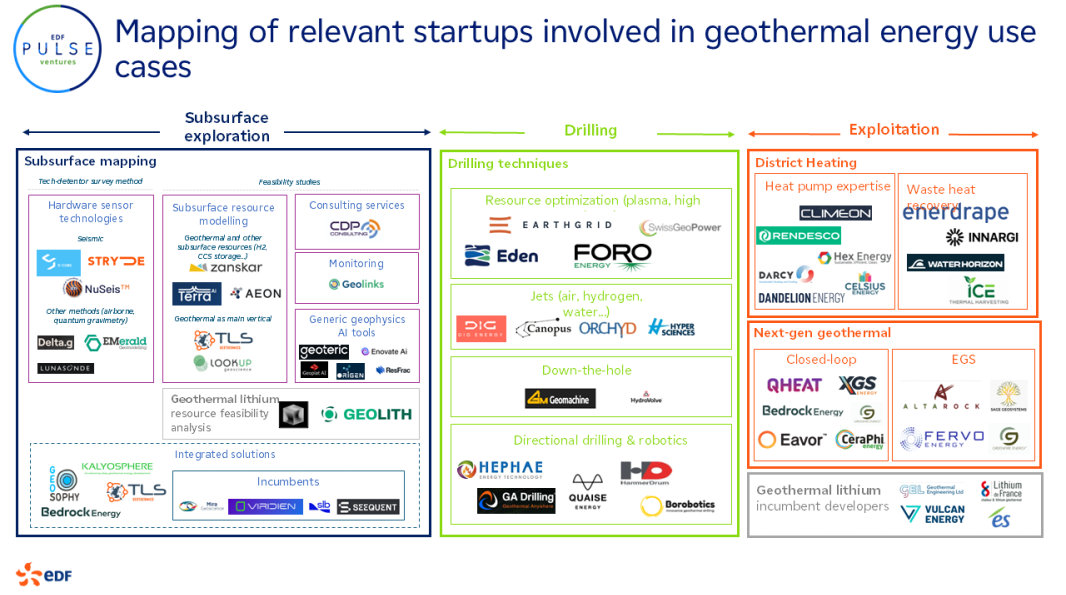As the geothermal energy market is booming, the EDF Pulse Ventures team has conducted a comprehensive analysis of this renewable energy source's potential. Working with several Group entities and subsidiaries, including Dalkia, the corporate venture has identified approximately fifty innovative startups in this field.
What is geothermal energy?
Geothermal energy harnesses the heat naturally contained in the ground to generate electricity or heat. The ground temperature varies with depth, from 10-20°C at the surface to 5,000°C at the Earth's core. In mainland France, the temperature rises by 3°C for every 100 m of depth.
Geothermal applications differ based on the heat extraction depth. Shallow systems (0 to 200 metres), are mainly designed for residential heating, in particular through geothermal heat pumps. Deeper boreholes are designed to supply heat to power stations or industrial sites requiring high process temperatures. Emerging technologies are developed, targeting increasingly deep reservoirs.
Currently, Geothermal energy accounts for approximately 1% of global energy supply1, while technically exploitable resources are estimated at 200 GW for electricity generation alone. By 2022, installed geothermal power capacity will reach 16 GW2 worldwide.
EDF Pulse Ventures identifies 4 key advantages of geothermal energy
-

Low-carbon energy available everywhere
By harnessing the Earth's natural heat, geothermal energy uses a renewable source of energy that does not emit greenhouse gases.
-

A high load factor
Geothermal energy is one of the most stable sources of energy, as its production is independent of weather conditions. Its load factor3 ranges from 60% to 90%.
-

Durability
Geothermal installations can operate over the long term, like hydraulic dams.
-

Versatile applications
Beyond electricity generation, geothermal energy efficiently heats and cools buildings. Additionally, geothermal brines can be used to extract lithium, a critical component for energy storage batteries.
However, the technical challenges of exploiting geothermal resources remain
Geothermal projects development faces major economic and technical challenges. The capital costs (CAPEX) for drilling are substantial, particularly as drilling is carried out in a context of considerable uncertainty about the underground resource quality. In addition, this same drilling can jeopardise projects, particularly because of induced seismicity or groundwater pollution, when things are not executed according to plan. This situation creates a high-risk environment for project developers.
To improve geothermal projects viability, three priority areas for innovation are identified by EDF Pulse Ventures:
- Improving characterization of the resource and the structure of the rocks beneath the ground in the initial phase of projects.
- Improving drilling techniques to enable project developers to drill better, in new sedimentary layers or to avoid wear and tear on wellheads, which can increase operating costs and non-productive time.
- Develop technologies to expand significantly geothermal energy applications, at greater depth or by using heat directly in the dry rock.
EDF Pulse Ventures identifies the main innovations accross the geothermal energy value chain
The EDF group has deep expertise in this field through subsidiaries Dalkia and Électricité de Strasbourg, which have been involved in geothermal energy for over 40 years. New technologies are currently being developed for critical links in the geothermal energy value chain. In conjunction with other EDF Group entities, EDF Pulse Ventures has identified 3 key segments in this value chain:
Underground exploration: Artificial intelligence (AI), combined with advanced geophysical measurement techniques enables more accurate subsurface modeling. These innovations significantly reduce drilling project risks, which today can be interrupted due to insufficient knowledge of the resource.
Drilling techniques: Innovative drilling technologies are emerging to reduce costs, increase speed and improve heat reservoirs access. These include high-voltage pulse or electric arc wellheads, enabling rapid drilling in hard rock and directional drilling. In addition, real-time sensors and AI-powered drilling optimization can reduce failure risk and adjust parameters automatically
Resource exploitation: Innovative companies are pursuing two complementary approaches. On the one hand, innovative systems make it possible to recover the diffuse heat present close to the surface, even at low temperatures, thereby extending viable deployment areas. On the other hand, advanced technologies provide access to deeper, higher-temperature heat sources without the need for natural aquifers, thanks to closed-loop or stimulated systems (EGS).
EDF Pulse Ventures identifies approximately fifty innovative startups in geothermal energy

1Cleantech group’s study, 2024
2IEA, The Future of Geothermal energy, 2024 (p;30)
3Ratio between the energy actually produced over a given period and the energy that would have been produced if the installation had been operating at its rated power for the same period.

